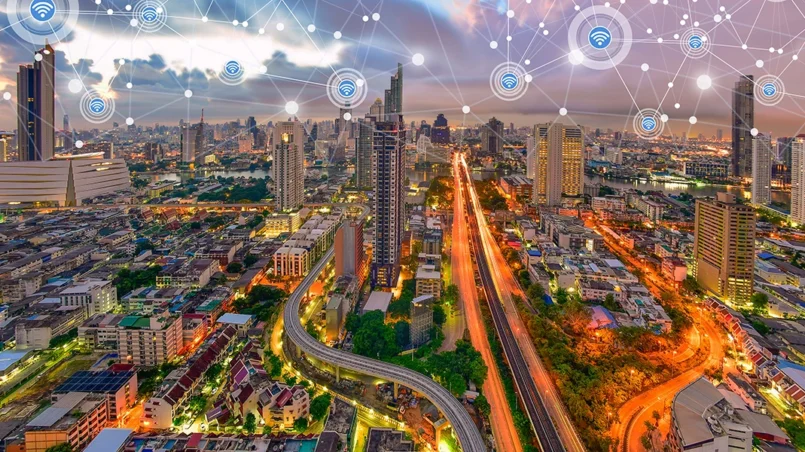Smart cities, leveraging the power of the Internet of Things (IoT), are transforming urban environments into more connected, efficient, and sustainable spaces. The concept of a “smart city” encompasses a wide range of applications, from traffic management and waste disposal to energy usage and environmental monitoring, all aimed at improving the quality of life for its residents and reducing the ecological footprint of urban areas.
The Foundation of Smart Cities: IoT
At the heart of the smart city revolution is IoT, a network of interconnected devices and sensors that collect and exchange data. This technology enables city officials and planners to monitor and manage city resources and services in real time. For instance, IoT devices can collect data on traffic patterns, air quality, water usage, and much more. This data, once analyzed, can be used to optimize city operations, leading to significant improvements in efficiency and sustainability.
Transforming Urban Mobility
One of the most visible impacts of smart cities is in the realm of urban mobility. Traffic congestion and pollution are perennial challenges in large urban centers. Smart traffic management systems use IoT sensors to monitor traffic flow and adjust signal timings in real time, reducing congestion and improving the efficiency of public transportation. Additionally, smart parking solutions help drivers find available parking spots quickly, reducing the time spent circling city blocks and, consequently, cutting down vehicle emissions.
Enhancing Public Services
Smart cities also transform how public services are delivered. IoT technologies enable more efficient waste collection through sensors that monitor the fill level of trash bins, ensuring that they are emptied just in time. Similarly, smart lighting systems adjust street lights based on natural light levels and movement in the area, significantly reducing energy consumption. Moreover, IoT devices play a crucial role in monitoring water supply networks, identifying leaks early, and ensuring that water distribution is optimized, conserving this precious resource.
Environmental Monitoring and Sustainability
Environmental sustainability is a critical aspect of smart cities. IoT sensors deployed across the city can monitor air and water quality, providing real-time data to authorities and citizens alike. This data can inform policies aimed at reducing pollution levels and can trigger alerts in the event of hazardous environmental conditions. Additionally, smart buildings utilize IoT technologies to monitor energy usage and automatically adjust heating, cooling, and lighting for maximum efficiency, contributing to the overall energy efficiency of the urban landscape.
Challenges and Considerations
While the benefits of smart cities are compelling, there are challenges and considerations that must be addressed. Privacy and security are at the forefront, as the collection and analysis of vast amounts of data pose significant risks if not managed properly. Cities must implement robust cybersecurity measures to protect against unauthorized access and ensure that privacy is respected. Moreover, the digital divide presents a challenge, as not all residents may have equal access to the technology and benefits that smart cities offer. Ensuring inclusivity and accessibility is paramount for the smart city vision to be truly realized.
Looking Ahead
The future of smart cities is promising, with continuous advancements in IoT technology driving further innovation. Artificial intelligence and machine learning are set to play a larger role in analyzing the vast amounts of data generated by IoT devices, leading to even more efficient and responsive urban environments. As cities around the world embrace the smart city concept, collaboration and knowledge sharing will be key to overcoming challenges and maximizing the benefits of this transformative approach to urban living.
Smart cities represent a paradigm shift in how urban environments are managed and experienced. Through the integration of IoT technologies, cities are becoming more connected, efficient, and sustainable, improving the quality of life for residents and setting a new standard for urban development in the 21st century. As we move forward, the continued evolution of smart cities will undoubtedly be a cornerstone in the quest for more livable, resilient, and inclusive urban spaces.
Share this post: on Twitter on Facebook on Google+

